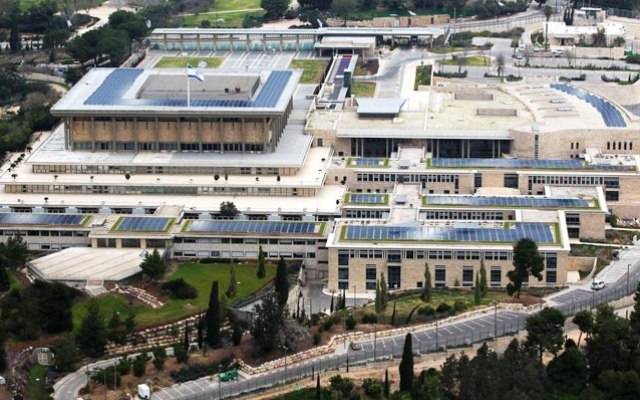
Israel’s parliament is leading the way towards a cleaner global environment after installing the largest solar field on any government building worldwide – while promoting other projects that highlight energy efficiency.
Israel’s parliament is moving forward with its “Green Knesset” Project. On Sunday, the Knesset will unveil the largest solar field of any parliament in the world, which should reduce costs by approximately NIS 1.5 million annually and improve environmental friendliness.
A total of 4.65 dunams of solar panels have been installed on the Knesset roof. This initiative is the largest and most important in the Green Knesset project, which was launched a year ago.
In the past few weeks, giant cranes have unloaded some 1,500 solar panels onto the Knesset building’s rooftops. These panels were created especially for the Knesset’s solar field and will have an electrical capacity of 450 kilowatts. The solar array, which cost the Knesset NIS 2.4 million, will create roughly 10 percent of the Knesset’s electricity, and together with additional energy-saving measures, it should reduce the Knesset’s energy use by a third.
The solar array will be the first of any national institution to operate according to this method. Ronen Plot, director-general of the Knesset, hopes that other government institutions and local authorities will follow suit.
A year ago, in January 2014, the Knesset launched the first part of its Green Knesset Project, consisting of 13 advanced projects for saving energy and water. In total, the Knesset has invested NIS 7 million in the project. All of the projects that were approved are economically viable, and the project should pay for itself within five years.
The yearly savings will be transferred to the “Green Fund,” which will be designated for the continuation of the Green Knesset as well as the creation of new green initiatives.
During 2014, the Knesset continued to reduce the amount of waste created and the unnecessary use of energy resources. The Knesset committees, for example, are now serving water in glass pitchers rather than in plastic bottles. In the past, some 60,000 plastic water bottles were supplied to the Knesset each year. There is also more recycling.
Knesset Secretary Yardena Meller-Horowitz requested that MKs send the Knesset Secretariat queries online rather than via hard copy. The Secretariat, in fact, has begun sending information by way of email to parliamentarians. This effort will save the Knesset 40,000-50,000 sheets of paper a year.
“The Green Knesset project is a project that spreads the vision of sustainability through the idea of ‘from Zion comes the Torah’. I am proud that the Knesset has become a model for the world on this matter and has already signed a number of international agreements for inter-parliamentary cooperation with an emphasis on Green Knesset,” Knesset Speaker Yuli Edelstein stated.
Recently, the Knesset signed inter-parliamentary cooperation agreements with a number of countries, including Ethiopia, Kenya, Uganda, Albania and Romania. Among the requests in these agreements are the promotion of environmental values and projects.
By: Aryeh Savir
Staff Writer, United with Israel
Click here for the latest Good News from Israel.
